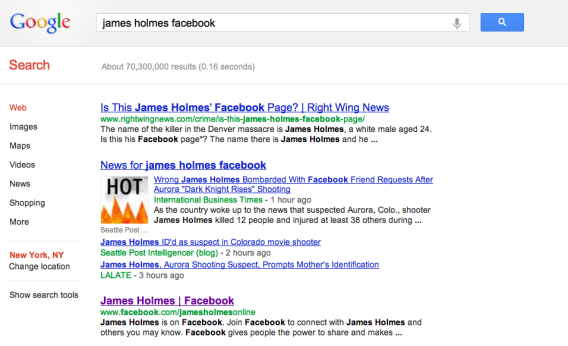Why the Internet Failed in the Search for the Batman Shooter

Screenshot
The Internet has trained us to assume that the intimate details of people’s lives must be out there on the Web somewhere, just waiting for us to enter the right Google search term or trawl the right social media platform.
News of the massacre at the Batman screening in Aurora, Colo., this morning sent a thousand journalists (and “citizen journalists”) to their browsers, racing to be the first to uncover the telling detail about the suspect. Would James Holmes turn out, like Tucson gunman Jared Lee Loughner, to have confessed in an online gaming forum to “hav(ing) aggression 24/7?” Might he have penned online political screeds, like Norway shooter Anders Behring Breivik?
Maybe. But if so, they weren’t forthcoming Friday morning. Mashable’s Lance Ulanoff writes of spending all morning scouring Facebook, Twitter, even MySpace for clues and coming up with absolutely nothing. “I cannot get over what an online ghost Holmes appears to be,” Ulanoff wrote.
At least Ulanoff came up with nothing. Others came up with something worse—misinformation and mistaken identity. “There is a Jim Holmes of Aurora, Colo., uh, page, ah, on the Colorado Tea Party site, talking about him joining the tea party last year,” ABC News’ Brian Ross excitedly informed milions of Good Morning America viewers Friday morning. Ross and the news organization apologized soon after, acknowledging that the report was incorrect.
Conservative sites such as Breitbart.com were predictably outraged by the bogus link, seeing in it a case of liberal media bias. But that indignation is perhaps undermined by Breitbart blogger Joel Pollak’s own unconfirmed “exclusive” headline that Holmes “could be a registered Democrat.”
Even non-overtly political James Holmeses weren’t immune to being fingered as the suspect by overzealous social media searchers. “I am not a 24-year-old gun-slinging killer from Aurora, I am a 22-year-old book-slinging mass eater from Littleton,” one beleaguered James Holmes wrote on his Facebook profile, after being pelted with “friend” requests from strangers.
More than political bias, these cases of mistaken identity seem to be a case of confirmation bias. We have a working hypothesis that the perpetrator of a random act of heinous violence must have presaged the act with a trail of ominous online activity. So when we find a search match for “James Holmes Aurora,” we’re ready to believe that the first minutiae we encounter about that person might help to explain the tragedy.
It’s that bias that made possible an ugly prank on the social image site 9gag, where someone posted an image suggesting that the killer had explicitly warned of his plans in advance. The hoax, which made it seem like others on 9gag had goaded the shooter to follow through, also played on the public’s readiness to blame the Internet for sociopathic behavior.
There are two possible explanations for why the search for the online James Holmes turned up only false leads. One is that this James Holmes truly is an online ghost—a rarity for a 24-year-old these days, though not out of the question. (Let’s resist for now the urge to speculate on how Holmes’ lack of an online persona might illuminate his personality and motivations.) The other is more mundane: Unlike Loughner or Breivik, the guy has a common name. Couple that with the fact that he lives in a large city—Aurora has a population of 332,000 and is part of a metro area of 2.5 million—and you have a recipe for a modicum of online anonymity in a data-flooded world.
Future Tense is a partnership of Slate, New America, and Arizona State University.

